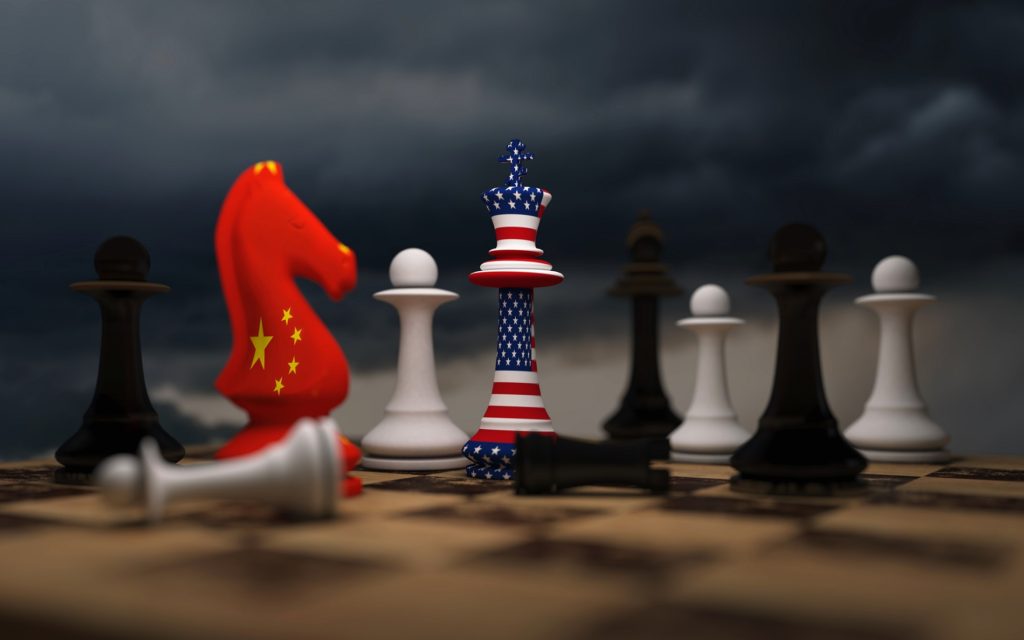
ICAS Bulletin (online ISSN 2836-3418, print ISSN 2836-340X) is published every other week throughout the year at 1919 M St NW, Suite 310, Washington, DC 20036.
The online version of ICAS Bulletin can be found at chinaus-icas.org/bulletins/.

– On August 14, almost two weeks after Pelosi’s trip, a second U.S. Congressional delegation arrived in Taipei. The officials had previously met with President Yool Suk Yeul in South Korea before flying to Taipei.
– In reaction to the Pelosi-led Congressional delegation to Taiwan, China has frozen top-level communications that have affected the progress of climate mitigation, military de-escalation, and countering narcotics trafficking.
– Amid Chinese backlash, Speaker Pelosi defended her visit and criticized China’s aggressive reaction. When asked about her thoughts on the sanctions enacted on her by Beijing, she commented that it was “incidental” and had “no relevance whatsoever.”
– On August 8, in response to China’s retaliatory military drills in the region, President Biden said he was “not worried,” but was “concerned” by China’s large deployment of equipment. The White House later summoned Chinese Ambassador Qin Gang to condemn the actions and assert the U.S. does “not want a crisis.”
– Countries in the region continue to tread lightly as they wait for both parties to act while expressing their strong desire for regional peace.
Associated News References:
“Delegation of U.S. lawmakers visits Taiwan amid tensions with China,” PBS News Hour, August 14
“Halt in China-U.S. talks threatens ‘complete free fall’ in ties,” Nikkei Asia, August 11 [Paywall]
“‘I don’t remember them ever telling us not to go’: Pelosi denies military opposed Taiwan trip,” Politico, August 10
“Biden says he’s ‘not worried’ about China’s response to Pelosi visit to Taiwan,” The Hill, August 8
“U.S. slams China’s ‘unacceptable’ disruption in countering fentanyl,” Reuters, August 8 [Paywall]
“China halts military, climate talks with U.S. after Pelosi’s visit to Taiwan,” CBS News, August 5
“White House summoned Chinese ambassador to condemn provocations after Pelosi’s Taiwan visit,” CNN, August 5
“Taiwan crisis: China imposes sanctions on Pelosi over ‘provocative actions,’” The Guardian, August 5
“Pelosi’s Taiwan trip leaves Asian countries nervously awaiting China’s response,” NPR, August 3

– After a second U.S. delegation visited Taipei on August 14, China’s military carried out more exercises in protest.
– The military exercises Beijing conducted in response to Speaker Pelosi’s delegation began directly after their departure from Taipei and concluded August 10 with further “regular combat readiness patrols” continuing indefinitely.
– President Biden expressed his “concern” for the live fire drills which are among the largest exercises conducted by China. Viewed as a “significant escalation,” the administration continued to assert that the U.S. would continue to conduct missions around Taiwan.
– While attending an ASEAN summit in Cambodia on August 5, Secretary of State Blinken stated “we will fly, sail and operate wherever international law allows.”
– On August 5, amid China’s military response, House Speaker Nancy Pelosi vowed that “China would not succeed in isolating Taiwan.”
– On August 4, China fired five ballistic missiles into the waters of Japan east of Taiwan. The action was seen as a reminder from Beijing to the U.S. of its strike capabilities to hit U.S. military installations in the region.
Associated News References:
“China conducts military drills near Taiwan as US lawmakers visit,” Al Jazeera, August 15
“U.S. Insists It Will Operate Around Taiwan, Despite China’s Pressure,” The New York Times, August 10 [Paywall]
“Biden ‘concerned’ as China extends military drills around Taiwan,” Reuters, August 10 [Paywall]
“China military ‘completes tasks’ around Taiwan, plans regular patrols,” Reuters, August 10
“US allies rattled by China’s aggressive response to Nancy Pelosi’s Taiwan visit,” Financial Times, August 6 [Paywall]
“Blinken: China military drills are ‘significant escalation,’” AP, August 5
“Pelosi vows China will not isolate Taiwan as military tensions soar,” The Washington Post, August 4 [Paywall]
“U.S. firms eye Taiwan exit on Chinese invasion risk,” Politico, August 4
“With 5 Missiles, China Sends Stark Signal to Japan and U.S. on Taiwan,” The New York Times, August 4 [Paywall]

– Five Chinese firms—China Life Insurance, PetroChina, China Petroleum & Chemical, Aluminum Corp. of China and Sinopec Shanghai Petrochemical—said they intend to delist their American depositary shares on the NYSE. A week later, China Southern Airlines and China Eastern Airlines also became suspected of preparing to delist.
– On August 9, the CHIPS and Science Act was signed into law by President Biden. The $53 billion bill is meant to strengthen the U.S. semiconductor industry by reducing foriegn dependence and address the global shortages of microchips.
– China criticized the CHIPS and Science Act, calling it a “threat to trade.” The Chinese Embassy in Washington, reflecting the sentiment, said the legislation held something reminiscent of a “Cold War mentality.”
– South Korea’s intention to join “Chip 4”—a U.S.-led semiconductor supply chain which could include the U.S., South Korea, Japan and Taiwan—has raised concern within China and was expected to be discussed in an upcoming meeting held between Foreign Minister Park Jin and his Chinese counterpart Wang Yi in Qingdao.
– According to the U.S.-based cybersecurity firm Mandiant Inc., the recent attempts to discredit prominent German anthropologist Adrian Zenz, who has investigated China’s targeting of Muslims, was conducted by Shanghai Haixun Technology Co.
Associated News References:
“China’s Airlines Could Join the Multibillion-Dollar Exit From US Stock Markets,” Bloomberg, August 15 [Paywall]
“Five U.S.-Listed Chinese Companies to Delist from NYSE,” The Wall Street Journal, August 12 [Paywall]
“The next frontier in the tech battle between the US and China,” CNN, August 10
“China criticizes US chip law as threat to trade,” AP, August 10
“US invests $280bn in high tech to compete with China,” BBC, August 9
“South Korea’s Yoon plays down concerns over intention to join US-led chip alliance,” South China Morning News, August 8 [Paywall]
“Pro-Beijing Online Campaign Targets U.S.-Based Xinjiang Researcher, Cybersecurity Firm Says,” The Wall Street Journal, August 4 [Paywall]

– The halt in bilateral talks between the U.S. and China after Speaker Pelosi’s visit to Taiwan has deadlocked climate progress between the world’s two biggest emitters of greenhouse gas emissions.
– The Uyghur Forced Labor Prevention Act, which took effect December 23, 2021, has stalled the import of solar shipments from China’s Xinjiang region. U.S. Customs has detained panels at the border and have shipped them back to China in recent weeks.
– The decrease in Chinese student visas to the U.S. concerns education administration officials. In recent years students—who have been an important revenue source for American universities—have chosen to study elsewhere due to the deteriorating nature of U.S.-China relations.
– On August 4, Chinese Businessman Shi Jianxiang was convicted on two counts of fraud related to obtaining visas that he used to enter the U.S. The Chinese fugitive fled China in 2016 when the financial group he controlled in Shanghai collapsed.
Associated News References:
“China’s suspension of climate talks with the US puts decarbonisation timeline, methane reduction targets and research at risk,” South China Morning Post, August 12 [Paywall]
“Chinese Student Visas to U.S. Tumble From Prepandemic Levels,” The Wall Street Journal, August 11 [Paywall]
“China’s cold shoulder bodes ill for climate fight,” Politico,
August 11
“Chinese solar panels seized at US border over possible human rights abuses,” Protocol, August 9
“U.S.-China diplomatic breakdown clouds outlook for global climate progress,” Reuters, August 6 [Paywall]
“Fugitive Chinese Businessman Convicted of Visa Fraud in U.S.,” The Wall Street Journal, August 5 [Paywall]

– Following recent Chinese military drills in the Taiwan Strait, experts and industry stakeholders fear disruption to the global shipping industry should exercises become a regular occurrence in this high traffic waterway.
– China’s textiles and garments exports surged by 17.5% in July in spite of the Uyghur Forced Labor Prevention Act, a law passed in June which effectively banned U.S. imports from the region accounting for 90% of China’s cotton.
– On August 9, federal prosecutors brought charges against Far East Cable Co.—China’s largest cable manufacturer—alleging that it aided ZTE Corp. in defying U.S. export controls by delivering restricted tech to Iran.
– On August 5, Apple warned its suppliers in China that they must comply with Beijing’s customs regulations, including a freshly-enforced rule that Taiwan-sourced products must be labeled as originating in ‘Taiwan, China’ or ‘Chinese Taipei.’
Associated News References:
”U.S. rethinks steps on China tariffs in wake of Taiwan response, sources say,” CNBC, August 10
“China’s ‘new normal’ for Taiwan raises fears for global trade,” Al Jazeera, August 11
“China trade: US’ Xinjiang ban looms large even as textile, garment exports surge to record US$33 billion in July,” South China Morning Post, August 11 [Paywall]
“U.S. Accuses China’s Largest Cable Manufacturer of Violating Export Controls,” The Wall Street Journal, August 9 [Paywall]
“Apple warns suppliers to follow China rules on ‘Taiwan’ labeling,” Nikkei Asia, August 5 [Paywall]

“U.S. is ‘not going anywhere,’ Middle East envoy says, as China’s Xi expected to visit Saudi Arabia,” CNBC, August 12
“China’s Xi Jinping Plans to Meet With Biden in First Foreign Trip in Nearly Three Years,” The Wall Street Journal, August 12 [Paywall]
“Now Elon Musk Is Telling China’s Censors About His Vision for the Future,” Bloomberg, August 14 [Paywall]
“Huawei Books First Sales Rise Since US Sanctions Hit Its Phones,” Bloomberg, August 12 [Paywall]
“South Korea, China clash over U.S. missile shield, complicating conciliation,” Reuters, August 11 [Paywall
“Taiwan bill looms, and it could pose ‘direct challenge’ for US-China ties,” South China Morning Post, August 10 [Paywall]]
“U.S., India prepare for mountaintop drills near China border,” Nikkei Asia, August 10 [Paywall]
“U.S. takes aim at Chinese and Russian influence in Africa strategy,” Nikkei Asia, August 9 [Paywall]
“One year after Afghanistan, spy agencies pivot toward China,” AP, August 8
“Fake Rubio Letter Part of Pro-China Campaign, Report Says,” Bloomberg, August 4 [Paywall]
“US Crackdown on Chinese Solar Means Sales Recovery Ruled Out,” Bloomberg, August 4 [Paywall]
“U.S. Generals, Diplomats Want Chinese Companies Out of Their Retirement Plan,” The Wall Street Journal, August 3 [Paywall]
August 4 by Atlantic Council
August 4 hosted by US-Asia Institute
August 4 hosted by SupChina
August 3 hearing by U.S.-China Economic and Security Review Commission
August 17 hosted by The US-China Business Council
August 22 hosted by Center for Strategic and International Studies
August 22 hosted by Hudson Institute
August 23 hosted by Center for Strategic and International Studies
August 24 hosted by East-West Center
by Sourabh Gupta and Yilun Zhang
August 8, 2022
On July 12, 2016, an arbitral tribunal constituted under the United Nations Convention on the Law of the Sea (UNCLOS) in the matter of the South China Sea Arbitration (Philippines v. China) ruled that:
China’s claims to historic rights, or other sovereign rights or jurisdiction, with respect to the maritime areas of the South China Sea encompassed by the relevant part of the ‘nine-dash line’ are contrary to the Convention and without lawful effect to the extent that they exceed the geographic and substantive limits of China’s maritime entitlements under the Convention (para. 278).
The tribunal went on to declare that “the Convention [had] superseded any historic rights, or other sovereign rights or jurisdiction, in excess of the limits imposed therein.” In its reasoning, the tribunal judged China’s ‘historic rights’ claim to “appear to be” an exclusive one. In this respect, it observed that:
The notion of sovereign rights over living and non-living resources is generally incompatible with another State having historic rights to the same resources, in particular if such historic rights are considered exclusive, as China’s claim to historic rights appears to be (para. 243).
There cannot be two equally definitive exclusive claims to a single water body. As such, the tribunal was correct to judge that Beijing’s claim exceeded the geographic and substantive limits of its entitlements under the Convention.
Senior Fellow Sourabh Gupta speaks at the International Forum on One Korea 2022
August 13-15, 2022 (Seoul, UTC+9)
Hybrid (Seoul, South Korea & Zoom)
ICAS senior fellow Sourabh Gupta participated in the Economy session of the International Forum on One Korea 2022 on August 13, 2022. He spoke on the relevance of the lessons of German unification to a free and unified Korea and, in particular, touched on the key economic planning policy errors committed at the time of German reunification.
On Monday, August 8, 2022, Senior Fellow Sourabh Gupta was interviewed by TRT World on the increased U.S.-China and Taiwan Strait tensions in the aftermath of Speaker Pelosi’s visit.
On Tuesday, August 9, 2022, Senior Fellow Sourabh Gupta was interviewed by NPR on the signing of the CHIPS and Science Act.
On Monday, August 8, 2022, Senior Fellow Sourabh Gupta was quoted by China Daily on the aftermath of Speaker Pelosi’s Taiwan visit.
On Sunday, August 7, 2022, Senior Fellow Sourabh Gupta was quoted by the South China Morning Post on China’s response to Speaker Pelosi’s trip to Taiwan.


The Institute for China-America Studies is an independent nonprofit, nonpartisan research organization dedicated to strengthening the understanding of U.S.-China relations through expert analysis and practical policy solutions.
1919 M St. NW Suite 310,
Washington, DC 20036
icas@chinaus-icas.org
(202) 968-0595
© 2024 INSTITUTE FOR CHINA-AMERICA STUDIES. ALL RIGHTS RESERVED.